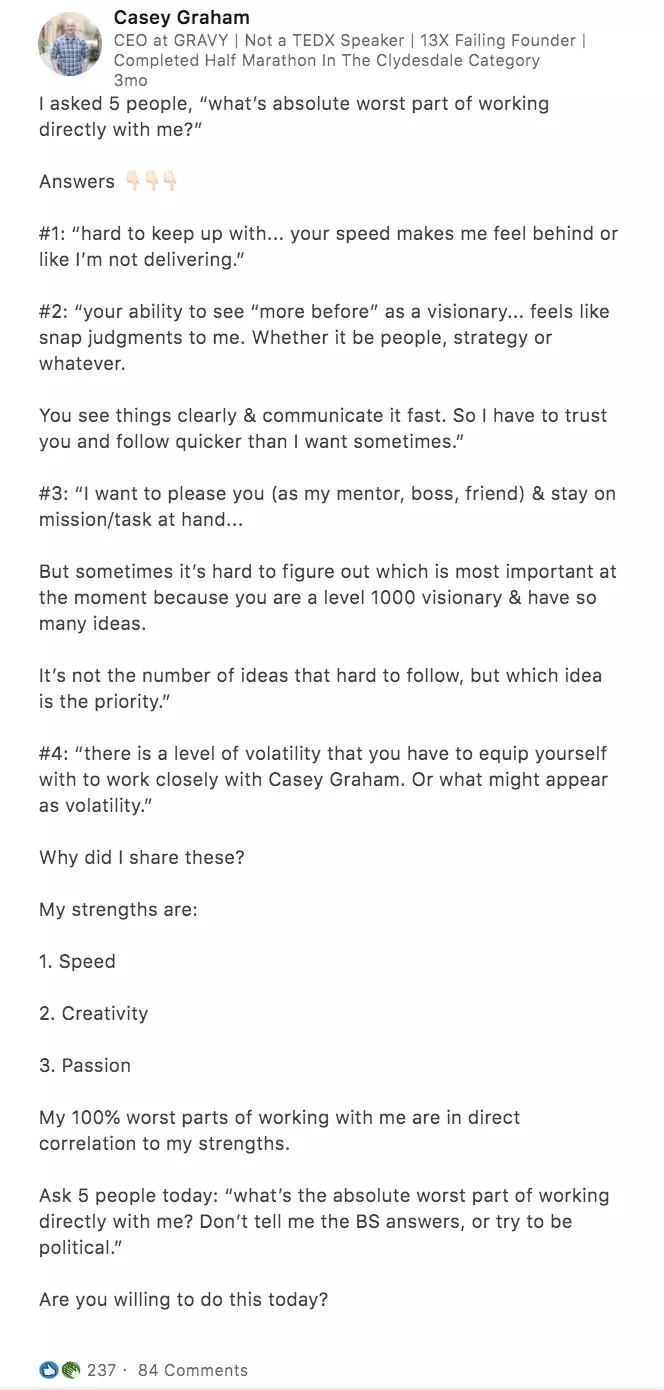Awareness, or more to the point, a lack of self-awareness, is a primary issue any Executive Coach focuses on to help a leader get better.
When a person holds a position of power and authority without clear, candid information about how their actions or behaviors affect their teams, it's a recipe for disaster. Unfortunately, this describes too many leaders.
In our preliminary research, most leaders believe they are self-aware. In actuality, only between 30%- 40% have proven they possess this skill. Moreover, many of the executives and managers we have studied over the last seven years have never even asked their team members for feedback about how they are leading. Their reasons varied from being overly confident, apathetic, or scared to hear the truth.
While asking your team for feedback can be a scary endeavor, research suggests those on the path to self-awareness are more confident, make better decisions, build better relationships, and communicate more effectively.
Nadeem Saeed backed this up by saying, “Self-Awareness is the first chapter in the book of leadership.”
Why We Avoid The Truth
Whether it be our finances, the quality of our relationships, or the way we are currently leading, it's just more comfortable to avoid the truth than confront it. Let’s face it, avoidance and denial have their short-term benefits -- they feel better. Self-preservation and protection from real emotion or pain can disguise itself as the best path. But, things have a way of catching up to you. They say the truth will set you free, but they never said anything about it being painless.
Leaders who avoid the truth move further away from being in a position of strength.
The vast majority of leaders will only go to the point in which it gets uncomfortable, then they stop. However, growth and development are right around the corner when we find out the truth, and we get a little uncomfortable. Daniel Chidiac said some wise words, “Being self-aware is not the absence of mistakes, but the ability to learn and correct them.”
How to Get Unbiased Feedback
As I wrote in Building the Best, a leader's most important job is to elevate others. It is nearly impossible to do this if you don't know how your skills or behaviors impact other people.
Thanks to Gallup's Strength's Finder, there is a strong trend for professionals to lean into their strengths and forget about their weaknesses. While this may be true when speaking of technical skills, it’s quite the opposite when it comes to leadership skills. A leader must discover and improve deficient skills because they negatively impact other people and your ability to lead them.
Great leaders lean into their weaknesses in order to elevate others.
To summarize so far, self-awareness is critical, and it will probably hurt. If you’re ready to take the plunge, here’s how you can begin to get feedback:
Simply put, you ask for it. Our team leverages SkillsLoft to help leaders understand their current leadership style and their strengths and weaknesses. This tool aids in getting candid feedback by keeping responses anonymous. But not every company invests in a 360° feedback tool and there are always gaps in them as well. Instead of waiting on a company leadership development program, you can use this one bold question Casey Graham, Gravy's CEO leverages to get unbiased feedback
“What’s the absolute worst part of working directly with me?”

What's so powerful about this, Graham sets the standard that his organization’s growth is directly tied to the growth rate of every leader within it. This question not only takes courage to send, but it shows your team and that you are in growth mode and models the behaviors you want to see from them.
What To Do After You Recieve Feedback
There is a huge caveat to asking for feedback. If you want to get honest, candid feedback, you must be willing to do something about it. If someone gives you feedback, and nothing comes of it, they won’t be as willing, to be honest with you again. The same can be said for your attitude when receiving some harsh criticism. After someone on your team or organization has given you feedback, follow these three steps:
- Thank Them - Thank them for taking the time and energy to share their insight, whether you agree with it or not. Say something like, “Thank you for taking the time to provide this to me. I am in growth mode as a leader, and I’m going to take some time to consider your feedback and what I am going to do to improve.”
- Act Differently Because of It - Once you determine if the feedback is accurate, formulate a plan for how you will act differently because of it. This may require training, coaching, or just good old fashion behavior change.
- Create a Reassessment Loop - There is nothing easy about changing behavior. Find a mechanism or cadence to create a reassessment loop. Ask your team at least for feedback at least once a year.
Closing
Personal and leadership growth starts with self-awareness. This visibility for where you are today allows you to get better tomorrow. Asking for, listening to, and accepting feedback as a gift is the best way to make this happen.
It will always be easier to avoid or ignore the truth. You decide if you want things to be easy or if you want to elevate those around you. If you're committed to your development and the development of those you lead, make it a priority to get feedback from them.
About the Author: John Eades is the CEO of LearnLoft, a leadership development company helping executives and managers to lead their best. He was named one of LinkedIn’s Top Voices in Management & Workplace. John is also the author of Building the Best: 8 Proven Leadership Principles to Elevate Others to Success. You can follow him on Instagram @johngeades.




Leave your comments
Post comment as a guest